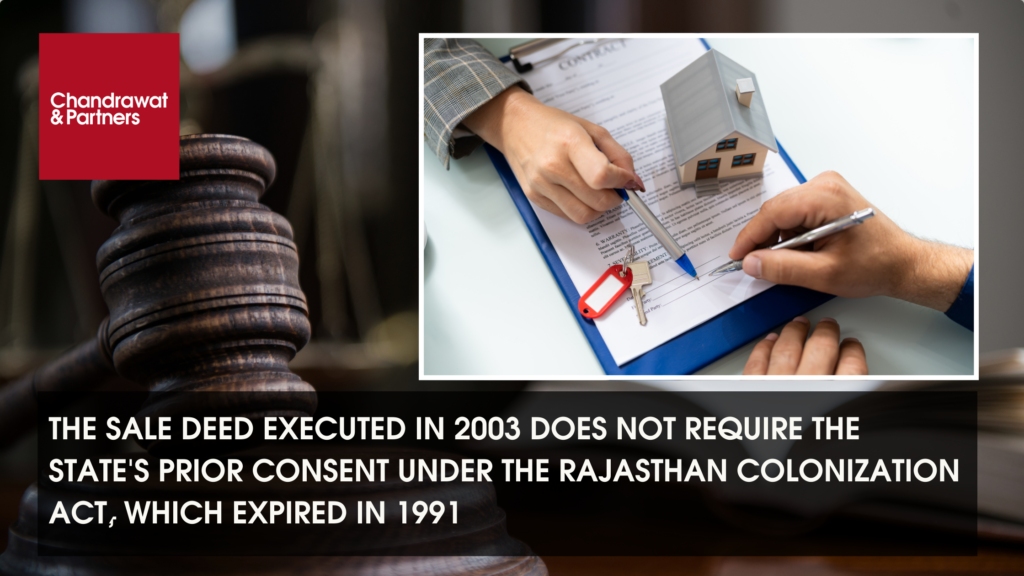Home > Recent Judgements > The Sale Deed Executed In 2003 Does Not Require The State’s Prior Consent Under The Rajasthan Colonization Act, Which Expired In 1991
Nov 20, 2024

BACKGROUND
In the case between LRs. of Dalip Singh and Ors. v State of Rajasthan & Ors., the case revolves around a land sale transaction where the petitioners’ predecessors in title agreed to purchase land in 1986 but the sale deed was not executed until 2003 following a court decree from 1999 for specific performance. The original owner had failed to obtain the required prior consent from the State under the Rajasthan Colonization Act, 1954 before transferring the land. In 2021, the Sub Divisional Officer (“SDO”) declared the sale void due to the lack of consent, triggering the petitioners’ challenge. The Rajasthan High Court quashed the SDO’s order, ruling that since the Act had ceased to be operative in 1991 and considering the lapse of over 20 years, the sale could not be annulled based on this technicality, particularly as Section 13A of the Rajasthan Colonization Act, 1954 allowed for rectification of such violations.
ISSUES
- Whether the requirement for prior State consent under Section 13(1) of the Rajasthan Colonization Act, 1954, applied to the sale of land in this case, given that the Act ceased to operate in 1991, and the sale deed was executed in 2003?
- Whether the failure to obtain prior consent from the State Government, due to the ignorance or illiteracy of the petitioner’s predecessors in title, can be used as grounds to annul the sale after 20 years, despite the transaction being executed in accordance with a Civil Court decree?
- Whether the Sub Divisional Officer (“SDO”) had the authority to declare the sale void after a decree had already been passed by the Civil Court and the sale deed had been executed in 2003, considering the provisions of the Rajasthan Colonization Act, 1954?
JUDGEMENT
The Jodhpur bench of the Rajasthan High Court quashed an order that had declared the sale of land to the petitioners’ predecessors-in-title void, on the grounds of the seller’s failure to obtain prior consent from the State as required under the Rajasthan Colonization Act, 1954. The Court held that since the Act ceased to operate in 1991, and the sale deed was executed in 2003, the requirement for State consent was no longer applicable. Furthermore, even if consent had been required, the Court found that the 20-year delay in challenging the sale, combined with the absence of any other irregularity in the transaction, meant that the sale could not be annulled on such trivial grounds. The Court emphasized that rights accrued by the purchasers could not be set aside due to a lapse that occurred more than two decades ago, especially when Section 13A of the Act allowed for regularization of such transfers through payment of a compound fee. Consequently, the Court set aside the SDO’s order and upheld the validity of the sale.
OBSERVATION
The Rajasthan High Court, in this case, observed that the sale of land, executed in 2003, could not be declared void solely due to the lack of prior consent from the State under the Rajasthan Colonization Act, 1954, especially when the Act had ceased to be operative in 1991. The court emphasized that the sale, which was based on a civil court decree from 1999, had legally transferred the land to the petitioners’ predecessors, and any delay or ignorance regarding the required consent could not annul the rights accrued over 20 years. Furthermore, even if the consent was necessary, the court noted that such a trivial lapse could be remedied through the payment of a compound fee under Section 13A of the Act, and thus, the sale should not be invalidated.
For more information or queries, please email us at
enquiries@chandrawatpartners.com




